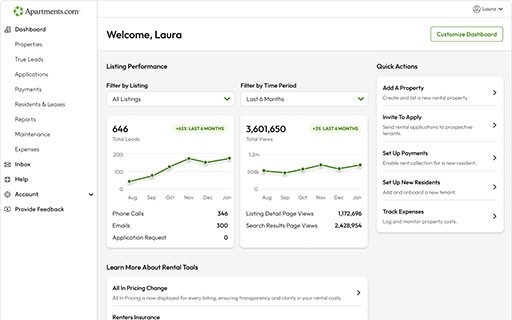
Illinois has an extensive set of rental laws that continue to evolve each year. To keep abreast of these changes and stay compliant, you need to familiarize yourself with the landlord-tenant laws in Illinois and any changes in 2025.
Key Takeaways
- Illinois’ 2025 legal updates strengthen tenant rights with new laws on landlord retaliation, reusable screening reports, mandatory flood disclosures, and fee-free payment options for rent. Landlords must also start including a state-issued tenant rights summary in leases by 2026.
- Chicago rental laws go beyond state requirements, mandating strict habitability standards, capped late fees, security deposit interest, and longer notice periods.
Overview of Rental Laws in Illinois
The main landlord-tenant laws of Illinois are covered in 765 ILCS 705-755.
Rent control (50 ILCS 825)
Rent control is illegal in Illinois; local governments and cities cannot create rent control laws.
Security deposit return (765 ILCS 710)
When a tenant moves out, the landlord has 30 days to send a written list of any damages, repair costs, and receipts by mail, email, or in person. If the landlord doesn’t send this list, they must return the full security deposit within 45 days. Landlords can charge for damage beyond normal wear and tear, and they can include their own repair labor if the cost is reasonable.
If a landlord ignores these rules, a court can require them to pay the tenant twice the deposit amount, plus legal fees.
Rent concessions (765 ILCS 730)
Landlords must be upfront about any rent discounts or special deals they offer tenants. A rent concession is anything that lowers the true cost of rent, like a free month or reduced rate, that isn’t listed in the lease.
To stay compliant, landlords must follow specific rules on including the concession in the lease, like marking the lease clearly with “Concession Granted” and explaining the details and value of the concession.
Utilities (765 ILCS 735)
This law ensures tenants keep essential services, and landlords stay accountable for their part of the utilities. So, landlords must pay utility bills on time when they’re responsible for services like water, gas, or electricity. If utilities are shut off because of nonpayment, tenants can pay the bill themselves, deduct the cost from rent, or end the lease. Landlords must also give written notice and provide the past 12 months of utility bills before renting if meters cover shared spaces.
It’s illegal to shut off or tamper with utilities to force tenants out. If tenants pay for utilities they don’t owe, they can recover those costs, and possibly damages or legal fees.
Safe homes (765 ILCS 750)
There are protections for tenants who are victims of domestic or sexual violence, stalking, or dating violence. They can end their lease early if they’re in danger. Tenants must give written notice before or within three days of moving out, explaining the threat and providing proof, such as a police report, court order, or letter from a professional.
Tenants can also request a lock change for safety by giving written notice and documentation. Landlords must change the locks within 48 hours or let the tenant do it, and they may charge a reasonable fee. Landlords cannot disclose that a tenant used these rights or share related information.
Immigration tenant protections (765 ILCS 755)
It is illegal for landlords to harass, threaten, or evict tenants based on their immigration or citizenship status. Landlords cannot threaten to report, or actually report, a tenant to immigration authorities, police, or anyone else to pressure them to move out. These protections apply to all rental housing, whether the agreement is written or verbal.
Fair housing (775 ILCS 5 Article 3)
Illinois fair housing rules are set by the Illinois Human Rights Act. As a landlord, you cannot discriminate because of protected traits, including race, color, religion, national origin, ancestry, sex, sexual orientation, marital status, age, familial status, disability, immigration status, source of income, or arrest record. Discriminatory acts include:
- Refusing to rent
- Setting different terms
- Misrepresenting availability
- Refusing to rent
- Making a rental more difficult to rent out
Advertising and screening materials also can’t express a preference or limitation tied to those traits. Steering, blockbusting, and using criteria that have an unnecessary disparate impact are prohibited as well.
You must provide reasonable accommodation and allow reasonable modifications for renters with disabilities. You also can’t charge extra or refuse to rent because a renter has a service animal.
Eviction (735 ILCS 5)
This section outlines everything you need to know about eviction. Landlords cannot change the locks, remove belongings, or force tenants out on their own. You must file an eviction action in court, and only a sheriff or authorized officer can carry out the eviction after a judge issues an eviction order.
You can start the eviction process if:
- Rent isn’t paid after giving the tenant a written 5-day notice.
- The lease ends, and the tenant stays without permission.
- The tenant breaks or violates the lease, such as damaging property, breaking building rules, or engaging in illegal activity.
- Someone moves in without authorization or legal right.
You must give tenants proper written notice before filing in court. The required notice period depends on the issue:
- 5-day notice for unpaid rent.
- 10-day notice for lease violations.
- 30- or 60-day written notice to terminate month-to-month or year-to-year leases.
If the tenant doesn’t move out or fix the problem within the notice period, you can then file an eviction complaint in court. You also must give the tenant a written notice with the reason for eviction once you file.
Habitable unit
Landlord must keep their rental up to local and state standards for being habitable. This can vary, but codes usually include guidelines related to:
- Radon (420 ILCS 46)
- Carbon monoxide alarms (430 ILCS 135)
- Smoke detectors (425 ILCS 60)
- Lead (410 ILCS 45)
- Exits/entrances
- Heat
- Water
Residential Tenants’ Right to Repair Act (765 ICLS 742)
Renters can fix certain issues themselves if their landlord doesn’t act. If a repair required by law or lease costs $500 or less, or less than half of the monthly rent, the tenant can notify the landlord in writing by certified mail.
If the landlord doesn’t fix it within 14 days (or sooner for emergencies that risk property damage or safety), the tenant can hire a qualified professional, pay for the repair, and deduct the cost from their rent. This only applies if the work is reasonable, properly done, and not for damage caused by the tenant or their guests.
Laws that don’t apply to private landlords
There are a few laws that only apply to landlords who own a certain number of units. While these laws might not apply to you, it is important to at least be aware of them.
- Security deposit interest (765 ILCS 715)
- Tenant utility payment disclosure (765 ILCS 740) for shared utilities
- The Rental Housing Support Program (310 ILCS 105) created a statewide program managed by the Illinois Housing Development Authority to support affordable housing
What’s New in 2025: Recent Legal Updates for Landlords in Illinois
Statement of rights (765 ILCS 752)
Effective January 1, 2026, this law requires landlords to provide tenants with a state-issued summary of housing rights for victims of domestic or sexual violence and stalking. The Illinois Department of Human Rights will create this summary, which outlines protections under several existing laws, including the Safe Homes Act and the Illinois Human Rights Act.
Landlords must include the summary as the first page of every lease or renewal, whether paper or electronic, and have each tenant sign each page to confirm receipt.
Landlord Retaliation (Public Act 103-0831) (765 ILCS 721)
The new Landlord Retaliation Act went into effect January 1, 2025, and protects tenants from landlords who try to punish them for exercising their rights. Landlords can’t raise rent, cut utilities, refuse to renew a lease, evict, or take other retaliatory actions if a renter does a protected activity or action like reporting unsafe conditions, requesting repairs, joining a tenants’ group, or taking legal action.
If a landlord violates this law, tenants can take them to court, end their lease, reclaim their deposit, or even recover up to two months’ rent (or double their actual damages), plus attorney’s fees. The law replaces the old Retaliatory Eviction Act and adds a key protection: if a landlord takes negative action within a year after a tenant’s protected activity, courts will assume it’s retaliation, unless the landlord proves otherwise.
Tenant Screening Reports (Public Act 103-0840) (765 ILCS 705/25)
Starting January 1, 2025, renters can share a reusable tenant screening report with landlords, meaning they won’t need multiple checks or be required to pay the screening fee each time. If the report meets the requirements, landlords cannot charge a fee to access the report or charge an application screening fee.
Reusable reports must meet the stipulated requirements:
- The report must be less than 30 days old.
- It has to come from a credit reporting agency at the renter’s request and expense.
- It must be available directly to the landlord or provided through a third-party site that regularly offers reusable tenant screening reports and follows all state and federal regulations.
- The landlord must be able to access and use the report at no cost.
- The report includes all the information that landlords typically ask during screening.
Landlords can still ask renters to verify that nothing important in the report has changed. If your city or county has stronger renter protections, those local laws still apply. Landlords can collect their own screening report, but it has to be at their expense, meaning they can’t charge the tenant another screening fee.
Landlord/Tenant Additional Fees (Public Act 103-0809) (765 ILCS 705/3.5)
Landlords who collect rent through third-party payment portals must provide tenants with at least one no-fee payment option. If your online payment system imposes charges or transaction fees, such as e-checks or other electronic payment methods, you must also allow tenants to pay by cash, paper check, or another method that doesn’t add extra charges.
Flood disclosure (Public Act 103-0754) (765 ILCS 705/25)
Flooding problems must be disclosed to renters before they sign a lease, including both future risks and past problems. Landlords must disclose in writing if the home is in a FEMA Special Flood Hazard Area and whether the property or parking areas have flooded before, including how often. If a renter applies for a lower-level unit, the landlord must also say whether that unit, or any part of the property, has flooded in the past 10 years.
This information must be included in the lease and be signed by both parties. The specific disclosure form needs to either be exactly like the example included in the law or at least extremely similar to it. If the landlord doesn’t disclose this information and the tenant later learns the property is in a flood zone, the renter can pursue compensation.
Local Ordinances Worth Knowing in Chicago, IL
Chicago introduces a whole new set of landlord-tenant laws that you must be aware of in Chapter 5-12 Residential Landlords and Tenants of the municipal code. It covers:
- Tenant responsibilities (5-12-040)
- Landlord responsibilities (5-12-070)
- Landlord access (5-12-050)
- Security deposit and prepaid rent (5-12-080)
- Security deposit interest rate (5-12-081)
- Written notice of owner’s or manager’s name and information (5-12-090)
- Habitability notices (5-12-100)
- Landlord (5-12-130) and tenant remedies (5-12-110)
- Subleases (5-12-120)
- Prohibited lease stipulations (5-12-140)
- Evictions and lockouts
- Retaliatory conduct (5-12-150)
If you are a landlord in Chicago, you should know these laws inside and out, including these key points.
Habitability requirements
Rentals must be kept up to code. One of the important parts of the code is the Chicago Heat Ordinance. This requires landlords to keep heating equipment in working condition or provide heat to tenants who can’t control it individually. It applies from September 15 to June 1 and must be at least 68°F during daytime hours and 66° during nighttime hours. Different rules apply to buildings with multiple units that have individual heating equipment.
Chicago Fair Housing Ordinance
Chicago has its own fair housing laws that provide additional protection to state laws. Landlords cannot discriminate based on protected categories.
Required notices
There are a couple of notices that must be given to tenants:
- Written notice of owner’s or manager’s name, address, and telephone number
- Code citations issued by the city in the past year
- Pending Housing Court or administrative actions that affect the rental or common areas
- Notice of utility provider’s intent to shut of essential utilities (ongoing throughout the entire lease term)
Notice periods
The Fair Notice Ordinance dictates the notice periods for lease terminations, non-renewals, and rent raises:
- 60 days if the tenant has lived in the rental for more than six months but less than three years
- 120 days if the tenant has lived in the rental for more than three years
It also stipulates the time period that tenants have to end eviction by paying back the rent owed and the court filing fees of the landlord.
Landlords must give two days’ entrance notice before entering the rental and they can only enter at reasonable times. In case of entry as required by emergencies, the landlord can enter without notice or consent but must give notice of the entry within two days afterwards.
Lockouts are not allowed
Lockouts, also known as self-help evictions, are illegal in Chicago. You cannot lock out a tenant, bar their access to the property, shut off essential utilities, or use any other method that do not comply with the law.
Security deposits
Landlords must issue a receipt for every security deposit received. If the payment is made electronically, you can provide the receipt electronically as well.
All security deposits must be kept in a federally insured, interest-bearing account with a financial institution located in Illinois in a separate account. Within 14 days of receiving the deposit, you have to inform the tenant in writing where the deposit is being held.
If you hold a tenant’s security deposit or prepaid rent for more than six months, you must pay annual interest, either in cash or as a rent credit. The security deposit interest rate is set each year, so it’s important to stay current on the applicable rate.
When a tenant moves out, you can deduct expenses for unpaid rent or damages, but only if you provide an itemized statement of damages within 30 days of move-out. This statement must include receipts or cost estimates for all repairs or replacements. Finally, you must return the remaining deposit and any required interest within 45 days of the tenant vacating the unit.
Late fees
Late fees are allowed, but the amount is capped. For monthly rent under $500, the maximum late fee allowed is $10.00 per month. If the rent goes above that, then for the portion that goes over $500, landlords can charge an additional five percent of that amount per month.
Late rent and eviction
Landlords have to give five days’ written notice before terminating the lease to the tenant if they fail to pay rent. However, the tenant can pay the amount of rent owed, plus the landlord’s court filing fees, before the judge issues an eviction order to avoid eviction.
Lease violations
if a tenant violates the lease or the housing code, the landlord may issue a written notice detailing the specific violation and give the tenant 10 days to fix the problem. If the tenant does not correct the issue within that time, the landlord may terminate the rental agreement.
When a lease violation causes an emergency or urgent repair, the landlord can require the tenant to correct the issue as soon as conditions allow or within 14 days. If the tenant fails to act, the landlord may enter the unit to make the repairs, and the tenant is responsible for all related costs.
Find, List, and Manage Rentals with Confidence on Apartments.com
Understanding Illinois rental laws is key to maintaining a compliant and successful rental. Whether you own one unit or several, Apartments.com Rental Manager helps simplify every step of the process. You can list your rental property, screen tenants online, and collect rent securely while knowing that you are following the law.
This material is intended solely for general information and should not be taken as legal, financial, or professional advice. For recommendations tailored to your situation, seek guidance from a licensed attorney or qualified expert.
FAQs
What are the new rental laws in Illinois?
The newest rental laws in Illinois cover:
- Statement of rights
- Landlord retaliation
- Tenant screening reports
- Additional fees
- Flood disclosure
How much time does a landlord have to give a tenant to move out in Illinois?
It depends on the issue. Nonpayment of rent has a five-day notice requirement while terminating leases has anywhere from 30-60 days, depending on the lease term. For evictions, the period before the sheriff enforces the eviction depends on the county rather than state law.











